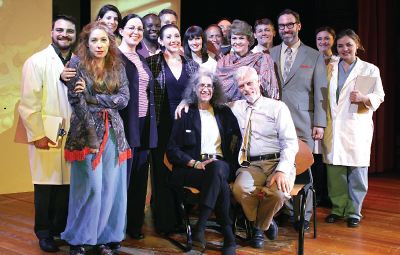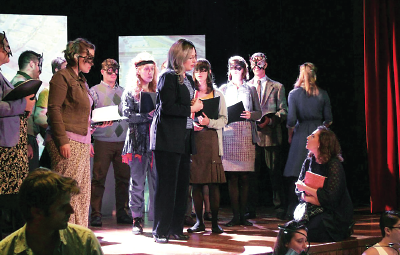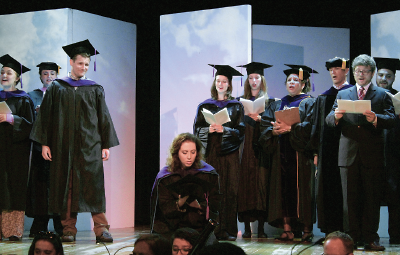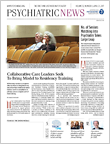“…Lost in a sea of madness! Lost in madness! Elyn Saks, Yale law student, 27. Mad as a hatter! Why? …How many times must I see it? See all the lives that are ruined? …I had a dream long ago to cure schizophrenia! To save the lives that it ruined! There’s nothing I can do. There is no cure. …When control is lost, she needs restraints! It seems barbaric. She won’t accept it. Yet it’s her only hope! I must keep her safe! Safe from herself! Safe from madness!” —Aria sung by “Dr. Kerrigan” in “The Center Cannot Hold” by Kenneth Wells, M.D., and Elyn Saks, J.D., Ph.D.
If opera is a musical form that condenses a narrative into intensely emotional turning points, then the story of a brilliant and creative woman with psychosis—one who once shouted Beethoven’s Fifth Symphony all night long to ward off hallucinations while she was in restraints—might seem a natural for operatic dramatization.
So, when Elyn Saks, J.D., Ph.D., lawyer, human rights activist, and recovering schizophrenia patient got together with psychiatrist Kenneth Wells, M.D.—an opera librettist and composer by avocation—a creative joint venture was born. Saks had served as a guest speaker for a performance of Wells’s first opera about Eleanor Roosevelt, “The First Lady,” in winter 2010. Afterward she said, “Let’s collaborate!”
Wells, who is the David Weil Professor of Psychiatry and Biobehavioral Sciences at the UCLA David Geffen School of Medicine, responded, “OK. A research grant or an opera?” “Both” Saks replied. The research grant about state variations in the use of physical restraints in psychiatric hospitals was never funded, but the opera would come to fruition when “The Center Cannot Hold,” a chamber opera in two acts, was staged for the first time at UCLA last summer. (Wells is also director of the Center for Health Services and Society at the UCLA Semel Institute and affiliated adjunct staff at RAND.)
Wells wrote the music and the original drafts of the libretto, with consultation from Saks. “The Center Cannot Hold” is based on the memoir by Saks of the same title and focuses on a period of hospitalization in New Haven when she was in law school at Yale in the 1980s.
In an interview with Psychiatric News, Wells said that as a psychiatrist—and as an artist—he is interested in the “turning points” in human lives, when individuals make a dramatic break from the past or move in a new direction.
“For Elyn, a turning point was when she got out of the hospital during her first year of law school and fought to get back into law school,” he said. “I saw that as tremendously courageous.”
Well’s Work Explores Clinician’s Anguish
The hospitalizations were harrowing, and Saks was in restraints for significant periods of time—an experience that would serve as a catalyst for her later
work advocating for the human rights of patients with schizophrenia. For Wells, who was a resident in psychiatry just before the period of Saks’s hospitalization when use of restraints and seclusion was very common, it was crucial in telling her story to include the perspective of the clinicians.
The aria reproduced above for “Dr. Kerrigan” (a fictional name for the attending inpatient psychiatrist) reflects the dilemma of the clinician ordering that a patient be restrained.
“In constructing the libretto, I put a lot of myself into it,” he said. “Dr. Kerrigan’s aria is a monologue justifying the use of restraints as the only recourse to keep her safe, but also expresses his own doubts and the hopes for a cure that he once had.
“I was a resident during the era when Elyn was hospitalized. A substantial part of the opera is telling the story of what it is like to be learning about mental illness and the experience of training. You sometimes have to do things to patients you are not sure are right. You are part of an infrastructure in the hospital where there are sometimes conflicts among staff, and people may feel threatened by patients if they are potentially violent. It’s an intense setting, but one also full of hope for recovery.”
To convey this, Wells created The Resident (“a fictional character who is sort of the Ken Wells of the story,” he said), someone both eager and to some degree overwhelmed by what he is learning about psychosis and the limitations of treatment. The character of Elyn Saks is portrayed in the opera by three singers: the narrator of the opera (mature Prof. Saks), the younger Elyn as law student, and the psychotic representation of Elyn, called “The Lady of the Charts.”
It goes without saying that Wells is a lover of opera, and he comes from a family of professionals in medicine, engineering, and other fields also possessed of diverse artistic talents. “I like to think that there are similarities between the creation of an opera score and the work of a psychiatrist,” he said. “A psychiatrist listens and enters into the life of another, gaining insight and coming out with an interpretation. Something like that was involved in translating Elyn Saks’s words into music.”
At the end of the first act of “The Center Cannot Hold,” the mature Prof. Saks, reflecting on her younger self portrayed in restraints, sings:
“It’s hard to speak up for yourself when you’re psychotic. Tied down and drugged and separated from all things familiar, …I had t o fight back. Some labels you must not accept! We all have the right to dream! I declare the right to dream!”
To which the hospitalized younger Elyn responds: “Can I still dream?” and the chorus of doctors, nurses, and patients on the ward reply, “We have a dream of hope and cure.”
Wells told Psychiatric News that as important as depicting the reality of psychosis in an involuntary treatment setting is the message of hope, the dream of a cure, and the promise of recovery. After all, Saks would graduate from law school—as “The Center Cannot Hold” depicts—and would go on to be a sought-after legal scholar and advocate for people with mental illness.
Wells said he hopes other physicians—especially young medical students and trainees—as well as patients, families, and the general public will see it, and he would like to see the video shown at APA meetings next year. “I want people who see the opera to know that it is possible to have a meaningful life and have a psychotic illness,” he said. ■
A video of the opera performed at UCLA can be viewed
here. More info about the opera may be accessed at “The Center Cannot Hold Opera”
website. Quotations from the copyrighted libretto are used with the permission of Wells and Saks.



